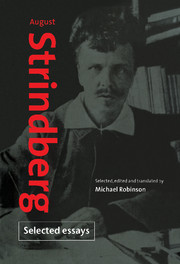Book contents
- Frontmatter
- Contents
- Notes on the text
- Introduction
- from Vivisections (1887)
- ‘On Modern Drama and Modern Theatre’ (1889)
- from Vivisections II (1894)
- ‘Césarine’ (1894)
- ‘Deranged Sensations’ (1894)
- ‘In the Cemetery’ (1896)
- from Jardin des Plantes (1896)
- ‘On the Action of Light in Photography’ (1896)
- ‘A Glance into Space’ (1896)
- ‘Edvard Munch's Exhibition’ (1896)
- ‘The Synthesis of Gold’ (1896)
- ‘Contemporary Gold-Making’ (1896)
- ‘The Sunflower’ (1896)
- ‘The Mysticism of World History’ (1903)
- ‘August Strindberg on Himself’ (1909)
- Notes and commentary
- Index
‘August Strindberg on Himself’ (1909)
Published online by Cambridge University Press: 18 December 2009
- Frontmatter
- Contents
- Notes on the text
- Introduction
- from Vivisections (1887)
- ‘On Modern Drama and Modern Theatre’ (1889)
- from Vivisections II (1894)
- ‘Césarine’ (1894)
- ‘Deranged Sensations’ (1894)
- ‘In the Cemetery’ (1896)
- from Jardin des Plantes (1896)
- ‘On the Action of Light in Photography’ (1896)
- ‘A Glance into Space’ (1896)
- ‘Edvard Munch's Exhibition’ (1896)
- ‘The Synthesis of Gold’ (1896)
- ‘Contemporary Gold-Making’ (1896)
- ‘The Sunflower’ (1896)
- ‘The Mysticism of World History’ (1903)
- ‘August Strindberg on Himself’ (1909)
- Notes and commentary
- Index
Summary
What are your strongest childhood memories?
Everything that I experienced as a child made a powerful impression on me, for I was hypersensitive both to my own and other people's sufferings. For example, no one dared to punish my younger brothers and sisters in my sight or hearing, for had they done so I would have intervened and throttled the tormentors. I was so outraged by injuries and injustice that I wanted to take my own life at 7 or 8 (I don't remember exactly). I wept over everything, and was consequently given a horrid name; I sometimes wept ‘for no reason’, or from the sheer pain of being alive, anticipating my terrible fate perhaps. I was born loving truth and justice; but people called me jealous if I disapproved when someone less deserving was preferred before me; and I was called vengeful if I didn't immediately forget every injustice, while other people never forgave me. So as to have a guiding rule for my own behaviour I kept a sharp eye on other people. What others allowed themselves, I considered I was allowed, too, but that was not the case; it was always harder for me. But I was certainly not without fault; I lied on several occasions out of fear, cowardice and shame, but experienced such feelings of remorse that I didn't willingly do so again. I was tortured into telling my first big lie, when I had to take someone else's misdemeanour upon myself. But I once said something that wasn't true, simply from a devilish whim or impulse, which I can't explain.
- Type
- Chapter
- Information
- August Strindberg: Selected Essays , pp. 223 - 229Publisher: Cambridge University PressPrint publication year: 1996



